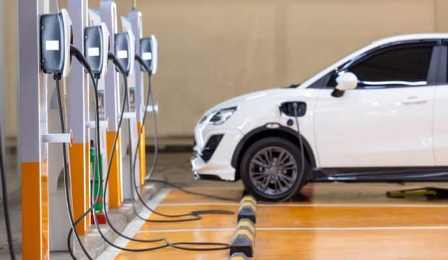President Cyril Ramaphosa’s quote of incentives for electric vehicles at the South African Auto Week 2024 was positively received by delegates attending the conference in Cape Town.
This pronouncement at the event, which marked the century-old automotive sector in the country, follows on a previous statement made at the Opening of Parliament on investigating the beneficiation of minerals critical to electric vehicles, rather than raw materials export.
President Ramaphosa summarized the electric vehicle transition as a major industrialization opportunity for Southern Africa, and a chance for South Africa to be positioned as a forward-thinking green economy. Immediate action is needed, if the country hopes to take advantage of the opportunities presented.
The South African government has the opportunity to make electric vehicles more accessible, stimulating a domestic market that would lead towards local production, and boost employment. Some changes in the existing vehicle tax structures will make this a reality.
A bi-lateral country project by the Electric Mission in South Africa and the Norwegian Electric Vehicle Association makes a case for adapting South Africa’s existing tax structures on vehicles to enable wider accessibility for electric vehicles for new vehicle buyers. This would also grow a pre-owned market of electric vehicles that would enable wider access for consumers considering lower priced electric vehicles.
“The electric vehicle market in South Africa has been growing year-on-year since 2013, but at a much slower rate to international regions – both developed and developing,” says Hiten Parmar, Executive Director at the Electric Mission. “Boosting local electric vehicle adoption is vitally important and will stimulate existing vehicle manufacturers towards local production for our current markets, resulting in economic growth and creating the opportunity for growing export opportunities, as targeted within the South African Automotive Masterplan 2035.”
The suggested changes would result in small adaptations in the taxation structure between electric vehicles and internal combustion engine vehicles, without impacting the revenue for government on new vehicle sales. “These recommendations set out the requirements under a revised system that would stimulate the local market” says Parmar.
The proposed tax adjustments provide international references, including Norway as a global leader in electric vehicle adoption, using its taxation system to emphasis the “polluter pays” principle to promote cleaner technologies. South Africa’s fiscal instruments, including the carbon tax introduced in June 2019, gives effect to the polluter-pays-principle and ensures firms and consumers take the negative adverse costs into account.
“Norway’s electric vehicle fleet has grown tremendously in a decade, not by making electric vehicles cheap by comparison to internal combustion vehicles, the focus has instead been to near-equalise the pricing for the consumer, making it equally attractive to opt for electric vehicles” said Christina Bu, the Secretary General of the Norwegian Electric Vehicle Association. “The result has seen a tremendous shift in consumer purchasing to electric vehicles year-on-year.” New vehicles sales in Norway are now consistently above 90 percent in favour of electric vehicles as the immediate technology of zero emission vehicles, defined in Norway’s National Transport plan of 2018 to be 100% by 2025. Bu was recently featured in the inaugural TIME100 Climate, a new list of the world’s most influential leaders driving business to real climate action in 2024 by Time Magazine.
The findings out of the bi-lateral project was that both South Africa and Norway have high taxes for new vehicle purchases. Addressing South Africa’s existing instruments of ad-valorem tax and the CO2 emissions tax structures accordingly, with an emphasis of the environment component, are all the basis of the recommendations. “This is not a subsidy scheme, but an incentive to broaden the appeal of zero emission vehicles to new vehicle buyers” says Parmar.
While the process would initially make electric vehicles more attractive to buyers, the end goal is to create demand for locally-produced electric vehicles, encouraging local manufacturing of the vehicles and their associated components. With the global shift away from fossil fuel transportation, the South African manufacturing industry needs to maintain pace with international developments, in order to ensure employment opportunities and a sustainable local automotive industry. The country’s primary exports markets of Europe and United Kingdom have announced phase-out targets of locally produced internal combustion engine vehicles.
At the recent United Nations Climate Change Conference, more commonly known as COP29, the appointment of Dr Dion George, South African Minister of Forestry, Fisheries, and the Environment, as Ministerial Pair alongside Norwegian Minister of Climate and Environment, Mr Tore O. Sandvik, is timeous in creating an opportunity for South Africa to learn from a leader in electric vehicle adoption at the highest levels of government.
©Copyright MOTORING WORLD INTERNATIONAL. All rights reserved. Materials, photographs, illustrations and other digital content on this website, may not be reproduced, published, broadcast, rewritten or redistributed in whole or in part without prior written permission from Motoring World International
Contact: editor@motoringworldng.com





